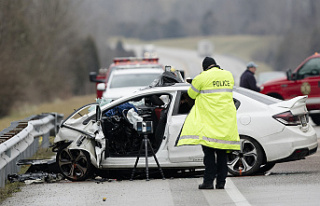According to the Ascension Parish Sheriff's Office on Facebook, at least one person was killed by Hurricane Irma. The victim, who was not identified by the Ascension Parish Sheriff's Office, was declared dead. Prairieville, Louisiana's capital is a suburb.
New Orleans' power outage increased its vulnerability to flooding. It left thousands without cooling or refrigeration during the scorching summer heat.
Ida, a Category 4 storm, struck on the same day Hurricane Katrina devastated Louisiana and Mississippi 16 year earlier. It landed 45 miles (72 km) west of where Category 3 Katrina first struck. Ida's 150 mph winds (230 kph), tied it for fifth strongest hurricane to hit the U.S. mainland. It was a Category 1 hurricane with maximum winds of 95mph (155 kmh). As it crawled along the coast, its eye was 45 miles (70km) northwest of New Orleans.
Meteorologists in New Orleans reported that significant flooding occurred in LaPlace, which is a nearby community to Lake Pontchartrain, late Sunday night. As the water rose, many people turned to social media to plead for boat rescues.
As the rising ocean flooded Grand Isle, landfall was made just to the west at Port Fourchon. Two hours later, Ida made another landfall near Galliano. The hurricane was moving through the far southern Louisiana wetlands, putting at risk the lives of more than 2,000,000 people who live in or around New Orleans and Baton Rouge.
Governor John Bel Edwards stated, "This hurricane is going to be stronger than we normally see." John Bel Edwards spoke to The Associated Press.
Louisiana residents woke up to a storm as Ida's winds increased by 45 mph (72 km/h) in just five hours. The hurricane was moving through the northern Gulf of Mexico, which is some of the most warm ocean waters in the world.
According to officials, the entire New Orleans city was without power late Sunday. Entergy, the city's power provider, confirmed that power was being supplied by generators. This was according to the Office of Homeland Security & Emergency Preparedness on Twitter. A screen shot was included in the message that stated "catastrophic transmitting damage" as the reason for the power outage.
Entergy provides power backup for the pumps that drain stormwater from the streets. This pump system will be tested by rain from Ida.
According to PowerOutage.US which tracks outages across the country, more than 1,000,000 customers were without power or service in Louisiana and more than 40,000 in Mississippi.
Wind ripped at awnings in New Orleans and caused buildings and water to leak out of Lake Ponchartrain. According to Petty Officer Gabriel Wisdom, the Coast Guard office in New Orleans received over a dozen reports about breakaway barges. According to Jefferson Parish officials, a barge broke off from a bridge in Lafitte, which is 35 miles (55km) south of New Orleans.
Ricky Boyette, spokesperson for the U.S. Army Corps of Engineers, stated that engineers noticed a "negative flow on the Mississippi River" as a result of storm surge. Edwards also said that he saw a live feed from Port Fourchon, where Ida arrived, that showed that roofs were being blown off buildings in many places.
Edwards said to the AP that "the storm surge is just incredible."
Officials stated that Ida's rapid intensification from a few storms to a major hurricane in three days meant there was no time for New Orleans' 390,000. residents to evacuate. On Sunday, Mayor LaToya Catrell advised residents to stay put.
Marco Apostolico stated that he felt comfortable riding out the storm at home in New Orleans' Lower 9th Ward. This was one of the most severely-hit areas of New Orleans after levees collapsed and unleashed a torrential floodwater during Katrina.
Brad Pitt helped rebuild his home to withstand the hurricane-force winds. The storm was still haunted by the ghost of Katrina.
He said, "It's evidently a lot of heavier feelings." "And yes, potentially frightening and dangerous."












